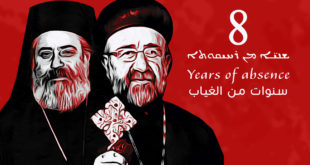The Assyrian Democratic Organization, which has had several run ins in the past with Syrian authorities, was to hold anniversary ceremonies two weeks ago, according to a statement it faxed to The Associated Press.
But political security agents in the northeastern city of Qamishli notified the head of the party’s politburo, Bashir Saadi, to «absolutely cancel holding any ceremonies regarding the anniversary without explaining the reasons behind the authorities’ decision,» the statement said.
Saadi confirmed in a telephone interview with the AP that a security official in Qamishli, 655 kilometers (410 miles) northeast of Syrian capital, Damascus, said a decision had been issued to «ban any aspects of celebrating the anniversary.»
«I was surprised by the authorities’ decision to ban the ceremonies, especially after the organization had invited all political and human rights national groups, including the ruling Baath party’s local leaders, to send representatives to attend,» former lawmaker Saadi said.
Government officials were not available for comment. The Assyrian organization, which was formed in 1957, has felt the wrath of the Syrian government several times since the Baath Party took power in a 1963 coup.
Despite going underground in 1963, the Assyrian group had 22 members of its leadership, including Saadi, jailed in late 1986 during an anti-dissent campaign. They were released six months later. In 1997, the government detained three party leaders, including Saadi, for another six months.
Syria’s Assyrian population is estimated at more than 500,000 people. About 200,000 live in al-Hasakah and Qamishli. While they enjoy freedom of worship, some Assyrians seek minority status to promote their language, Syriac, which only Assyrian churches now teach.
The Assyrian empire’s zenith was between the 9th and 7th centuries B.C., when it stretched from the Gulf through modern-day Iraq, Syria and Turkey to the Mediterranean Sea.
Since the secular Baath took power, Assyrians in Syria have been referred to as Arab Christians. Like the Kurds of the country, the Syrian constitution does not recognize Assyrians as a minority.
The decision to ban the Assyrian party’s anniversary comes a month after Syrian security authorities told Kurdish leaders to stop their parties’ political activities.
Since replacing his late father, President Hafez Assad, in 2000, Syrian leader Bashar Assad has released hundreds of political prisoners, but also clamped down on pro-reform and pro-democracy activists, showing there are limits to dissent.
 Assyrian Democratic Organization ADO
Assyrian Democratic Organization ADO





